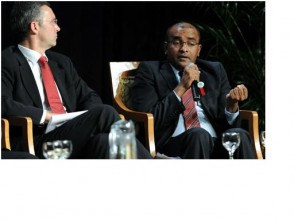At a forum on the edges of the Cancun climate summit meant to celebrate Norway’s efforts at global forest preservation, President Bharrat Jagdeo yesterday complained in front of its Prime Minister that Oslo was still to release money that Guyana thought would have been available a year ago.
A UK Guardian blog is reporting in its online edition that while Norwegian Prime Minister Jens Stoltenberg told his audience that the initiative was going “quite well” Jagdeo railed about what he said had been a “nightmare”.

“It’s a nightmare. It is a test of the sincerity of the developed world, and the delivery on development assistance has been abysmal,” Jagdeo told the forum. He noted that the first tranche of US$30M from a potential US$250M deal to protect Guyana’s forests has still not been made available by Oslo.
He said this was even though Guyana had met conditions demanded by Norway. While not a Mexican stand-off the exchange between the two leaders was uncomfortable.
“We have not seen a single cent expended as yet on the projects that are so vital to transformation.” There was a burst of applause. Stoltenberg, who had been staring hard at Jagdeo during his speech, did not join in, the Guardian blog reported.
As Norway saw it, the US$250m it had pledged to preserving Guyana’s forests was providing a model for how to tackle climate change. If there were delays in disbursing to Guyana, Stoltenberg suggested it was due to Norway’s insistence on “results-based financing”.
A fund has been set up under the auspices of the World Bank to handle disbursal of the first Norwegian tranche of US$30M.
For Jagdeo, the Guardian blog said, the programme was turning into a political disaster that could cost him the presidency. Efforts to secure the money led to meetings where Norwegian and Guyanese officials were outnumbered by dozens of World Bank bureaucrats.
“It’s this bureaucracy that we have. The structure is so complicated that everything gets bogged up – even the tiniest projects,” Jagdeo later told the Guardian in an interview. “You have to jump through hoops.”
He said the process was “humiliating”. He told the Guardian it also carried political risks, for rich as well as poor countries if leaders were unable to demonstrate progress.
“Countries like mine run a risk,” said Jagdeo. “Somehow people only think that a developed country has political capital to expend, like President Obama. But we in poor countries have political capital too”, the Guardian quoted him as saying.
It hadn’t been entirely without political risks for Norway either, Stoltenberg said. He said it had been difficult to persuade Norwegian voters in the depths of a recession that forest projects were in their interest. “It’s hard to win elections on a message of high taxation,” he said. “We won election last year but you never know, elections are uncertain things.”
However, the Guardian blog said there was one element on which the entire panel could agree: developed and developing countries needed to craft their forest conservation and development projects with extreme care.
As Jagdeo said: “If you can’t get it right with the country that you have been working at this for a while and that has all the political will in the world, those who are sitting on the fence now will be looking at the problems we are facing and saying: ‘we don’t want to go there’.”
The exchange, at an event organised by international network Avoided Deforestation Partners, depicted the challenges and frustrations of finding real life solutions for climate change.
At the Cancun talks forest preservation is regularly described as the quick fix of climate change – a cheap, relatively low-tech way of reducing greenhouse gas emissions. Led by Norway and America, countries have pledged US$4.5B for forest conservation projects in the past year.
“It is the shortest shortcut,” the UN secretary-general Ban Ki-moon told the event. Forest protection efforts have also been endorsed by the business world. Financier George Soros said he has been involved in forest preservation projects in Indonesia. The World Bank president, Robert Zoellick, said he wanted to see such efforts expanded to protect species as well as forests, the Guardian reported.
Such broad support has raised hopes of a deal which would bring in more funds from the developed world. However, the Guardian reported that there are obstacles and US negotiators have said they will not support a deal on forest preservation unless the core US demand –a monitoring and verification system is put into place.
Campaigners say key safeguards, to protect indigenous peoples and bordering areas, have been thrown out or watered down in the negotiations.
By last evening, officials had boiled down the negotiating text to its essentials, a two-page document just waiting for ministers’ signatures.
There were, according to campaign groups, only five points remaining where ministers will have to give a decision, the Guardian reported.
“This one’s wrapped up and ready to move,” said Zoellick. “Let’s close the deal.”





